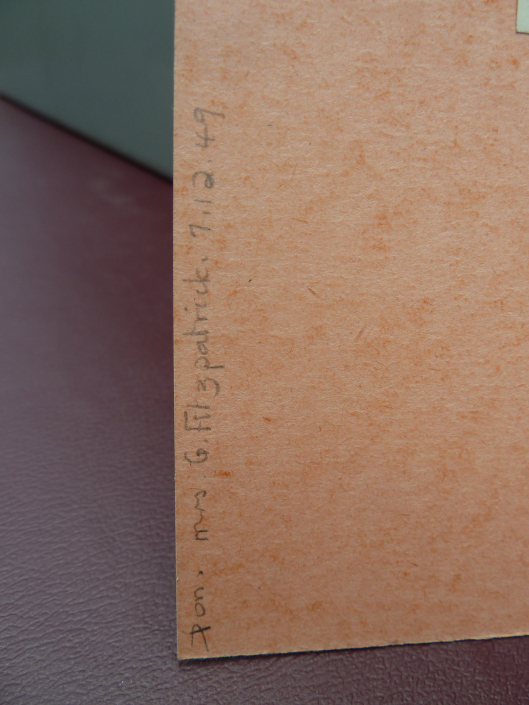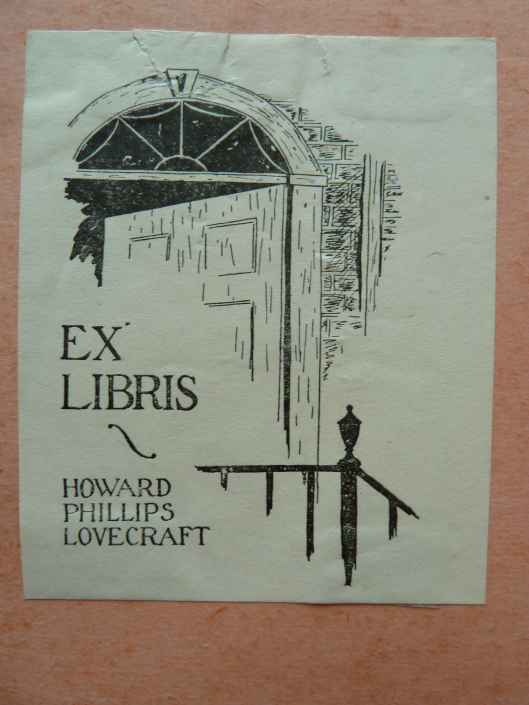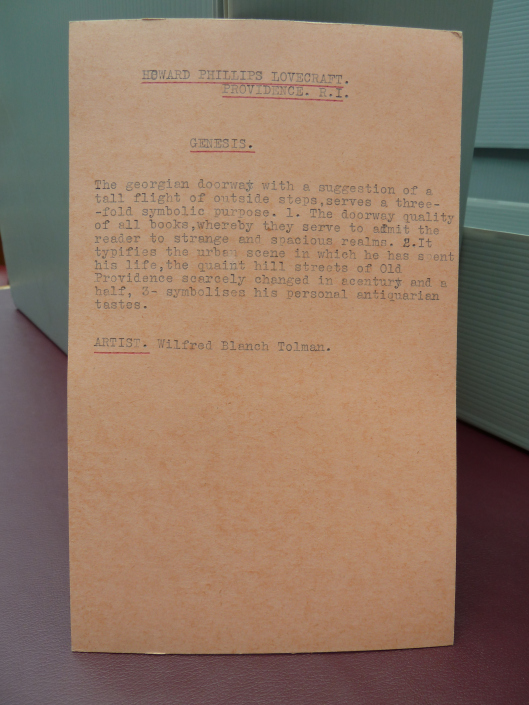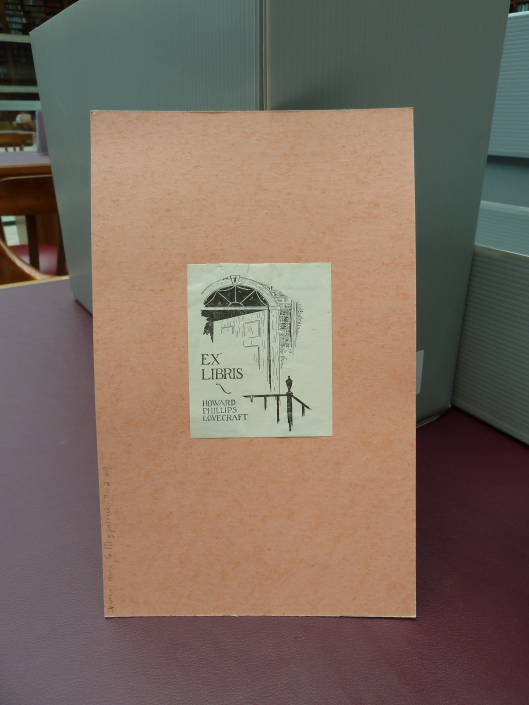This is my quick personal survey of notable Lovecraft items from 2014:
2014 seemed to be the year everyone wanted to use Lovecraft’s name to sell their stuff. Just the name, mind you, as many would-be producers appeared to be relatively ignorant of the man. The trend got so pronounced in 2014 that it wouldn’t have been at all surprising to learn that your granny’s dog was featured somewhere on Kickstarter, pitching Cthulhu flavoured doggie-chocs. Expect this odorous horde of naff T-shirts, RPGs, videogames, coffee-mugs, comics, key-fobs, TV series and board games to be shambling through the doors of your local thrift shops in 2015. And despite all that, there are still no H.P. Lovecraft pinball tables to be had, either in solid-state or digital form.
Far more culturally promising (judging by their generally good reviews) are the variety of adapted stage plays and fringe solo stage performances based on Lovecraft, including one play that was staged in Hollywood itself. The New York City Radio Theatre’s 2014 Lovecraft Festival seemed especially promising, in its scope and length. There was a three-day LARP, Lovecraft Legacies: Across the Vale of Years, a New England LARP, which one hopes might have been a dry-run for a fringe LARP festival alongside NecronomiCon 2015. There was even a circus, Dreams of Cthulhu, a H.P. Lovecraft Circus Spectacular, in Seattle.
A Lovecraftian music composer was nominated for a Grammy award, and the UCLA Los Angeles Chamber Orchestra is to premiere his imagined landscapes: six Lovecraftian elsewhere on the West Coast on 19th April 2015. 2014 also saw a CD release of Dreams in the Witch House: A Lovecraftian Rock Opera.
In films, the H.P. Lovecraft Film Festival 2014 once again did good service in hoovering up all the screen-worthy footage and giving it a big screen showing. The scarce and collectable documentary Lovecraft: Fear of the Unknown saw an affordable Kickstarter re-release in 2014, complete with its covetable extra 70 minutes of interview out-takes. Two of the biggest and best Hollywood sci-fi movies of 2014, Edge of Tomorrow and Interstellar, seemed to be underpinned by re-mixes of Lovecraft’s ideas and plots. The film director del Toro publicly conceded that his At The Mountains of Madness adaptation could after all be done as a PG-13 movie, reviving fannish hopes. George R.R. Martin (Game of Thrones) made a publicised visit to H.P. Lovecraft’s grave in Providence.
Major talent was at work in comics in 2014, albeit for 2015 releases. Alan Moore wrote the first ten issues of his graphic novel Providence, featuring Lovecraft and set in New England in 1919. Also hard at work in comics in 2014 was Jason Eckhardt, illustrating his substantial graphic novel of Lovecraft’s life. More generally, Lovecraftian art and illustration continued to thrive.
There were special Lovecraft-themed issues of various magazines, including the French-language Bifrost, the Italian Antares, and the free 3D art magazine 3D Art Direct. No issue of the Italian scholarly journal Studi Lovecraftiani appeared this year, it seems, but the Lovecraft Annual continued its regular appearance with a 2014 issue.
In Europe, Sweden saw its 4th Stockholm H.P. Lovecraft Festival, with city support. The major Lovecraft convention, NecronomiCon Providence, was announced for August 20th-23rd, 2015. Germany also announced a big Lovecraft convention in 2015. The fledgling tradition of the ‘HPL birthday present/mini-celebration’ continued to gain traction in 2014, the year of the 124th Birthday. Vermont, Marblehead and other Lovecraft-haunted places had small public lectures on Lovecraft’s local connections, perhaps planting seeds for the future.
The noted philosopher Graham Harman went on a speaking tour of the USA in early 2014, introducing university audiences to the uses of Lovecraft in Harman’s particular strand of academic philosophy. Interest in which appeared to continue to spread in 2014.
Much podcast and audio book goodness was released, both commercially and for free, including Dark Adventure Radio Theatre’s “The Dreams in the Witch House” and “Imprisoned with the Pharaohs” as feature-length audio adaptations.
Doubtless much serious Lovecraftian fiction was produced, as usual. I don’t have either the time or the cash to be able to read such, but S.T. Joshi is presumably now ploughing through it all for his revised book The Rise and Fall (and Rise) of the Cthulhu Mythos (now firmly set for 2015 release, it seems). And the lawyer Leslie S. Klinger did great service for future Sherlock Holmes—Lovecraft mythos fiction mashups, by winning his legal appeal against the Arthur Conan Doyle Estate, over their played-out copyright claim to the Sherlock and Watson characters.
The John Hay Library at Brown University was reportedly re-opened after a major refurbishment, with the Lovecraft collection materials now able to be consulted in… “a new state-of-the-art special collections reading room in the area that formerly housed University Archives”. Though I’ve not yet heard what the new John Hay experience is actually like for Lovecraftian scholars, re: noise, light and comfort. In 2014 Brown University also sent out their first call for the S.T. Joshi Endowed Research Fellowship (application deadline: 31st January 2015) for Lovecraft studies.
2014 was the year when various amateur press collections, held in university archives, began to get some tentative cataloguing attention and little bits of funding. The Fossil continued to appear, and one of its 2014 issues was a special on amateur press collections held in the archives. The University of Iowa Libraries announced they would digitize their collection of 10,000 science fiction fanzines. Also at Iowa, Lovecraft scholar Ken Faig donated his amateur journalism collection to the Special Collections Department there.
Regarding the digitization of more commercial material, Lovecraft-era digital archives of the Brooklyn Daily Eagle newspaper and Popular Science became freely available online, aiding scholars. Scans of some Lovecraft era Weird Tales were available on Archive.org. Some of Lovecraft’s core classical reference works also came online. Hathi placed online a handy keyword search tool for the first edition of The Ancient Track. The wiki Wikithulhu continues to build into a valuable free online reference tool, developed by the author of the new book Sex and the Cthulhu Mythos. My own JURN search tool was cleaned and greatly expanded in scope, helping independent scholars of all types to easily find free full-text academic articles and chapters.
A variety of scholarly work on Lovecraft and the pulps appeared in articles, anthologies and solo books. The sheer volume of such work now merits a considered “The Year’s Work in Lovecraft” summary essay in the next Lovecraft Annual, but my own Open Lovecraft page at least tries to track work freely available online. Especially notable among the books was S.T. Joshi’s Lovecraft and a World in Transition: Collected Essays on H.P. Lovecraft, and the chunky H.P. Lovecraft: Letters to Elizabeth Toldridge & Anne Tillery Renshaw. Klinger’s weighty and oversize New Annotated Lovecraft must have decimated Canada’s forests for its wood-pulp, but it appears to have been worth the effort since it had mainstream press publicity toward the end of 2014. Klinger’s successful publicity blitz has helped counteract a summer of orchestrated online controversy, during which a few leftists tried and failed to effectively banish Lovecraft from fandom over his racial views and sentiments.
Robert M. Price completed a successful crowd-funder to save his house roof from vanishing into the fourth dimension, while producing a bundle of wide-ranging podcasts on Lovecraft. He was also filmed for a forthcoming feature-length documentary about his life and work, titled The Gospel According to Price.
Lovecraft would no doubt have been gratified that his fame may have helped prompt an excellent budget-cost Henry S. Whitehead anthology in 2014, in paperback and Kindle. The Collectors’ Book of Virgil Finlay was another such major book in 2014. Diversion re-published 14 Henry Kuttner book titles for the Kindle.
Finally, there was a plausible claim that the Lovecraft family bible had been found. The bible seemed genuine enough from a distance, but so far as I know no scholar has been allowed to examine it in person.










